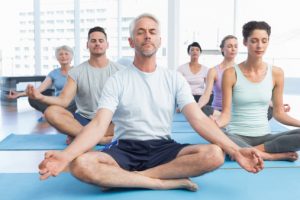 Yoga has been found to help diminish side effects associated with prostate cancer treatment. The findings come from researchers led by Neha Vapiwala, M.D. at the Perelman School of Medicine at the University of Pennsylvania.
Yoga has been found to help diminish side effects associated with prostate cancer treatment. The findings come from researchers led by Neha Vapiwala, M.D. at the Perelman School of Medicine at the University of Pennsylvania.
Side effects experienced due to prostate cancer treatment are fatigue, changes in sexual health, and urinary incontinence. These side effects became stable in the men who engaged in yoga over the course of the study. Dr. Vapiwala said, “Data have consistently shown declines in these important measures among prostate cancer patients undergoing cancer therapy without any structured fitness interventions, so the stable scores seen with our yoga program are really good news.”
Advertisement
Cancer-related fatigue has been shown to negatively impact a person’s quality of life. As opposed to regular fatigue, which is combated through rest, cancer-related fatigue may be long lasting and does not decrease after sleep or rest. Furthermore, cancer-related fatigue is the most common side effect reported – experienced by 60 to 90 percent of patients. Erectile dysfunction is also reported by 21 to 85 percent of prostate cancer patients, along with urinary incontinence, which is reported by 24 percent of patients.
The benefits of yoga have been shown to help reduce cancer-related fatigue as well as strengthen pelvic floor muscles and increase blood flow. The latter aspects may help improve erectile dysfunction and urinary incontinence.
Dr. Vapiwala added, “There may also be a psychosocial benefit that derives from participation in a group fitness activity that incorporates meditation and promotes overall healthiness. And all of this ultimately improves general quality of life.”
Although previous research revealed benefits of yoga in cancer patients, it focused primarily around breast cancer treatments. Information on yoga and prostate cancer treatment is lacking; there is a perception that men will not take part in yoga. National statistics reveal that 72 percent of yoga participants are female and only 18 percent of participants are over the age of 55 – the median age of prostate cancer diagnosis is 66.
Dr. Vapiwala explained, “Despite these figures, we found that a structured yoga intervention in the form of twice-weekly classes is feasible for patients during a six- to nine-week course of outpatient radiotherapy for prostate cancer. Our participation-rate finding alone is important because it is a caution against making assumptions about patients without proper evidence.”
Sixty-eight patients participated in the study and 45 of them consented to follow through with it. They participated in yoga taught by a trained individual twice a week for 75 minutes. Eighteen participants voluntarily left the program due to conflicts but the remainder completed the program.
The participants felt a sense of well-being after the classes were done and many requested and received at-home training.
All three common side effects were shown to improve over the course of the yoga sessions.
Advertisement
Dr. Vapiwala concluded, “We offer several ways to enhance quality of life, minimize or reduce side effects of cancer and cancer treatment, and promote healing and recovery. This study represents one of many research projects we are conducting in an effort to pinpoint the best, most effective practices to help patients with these needs.”
The findings were reported at the Society of Integrative Oncology’s 12th International Conference.
